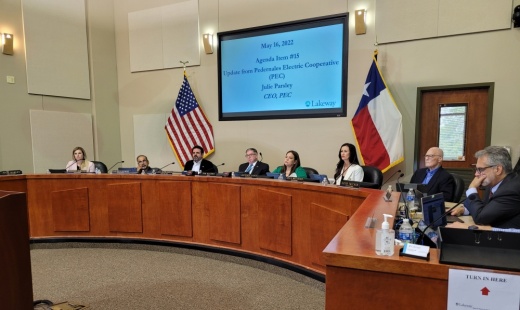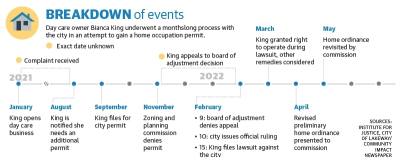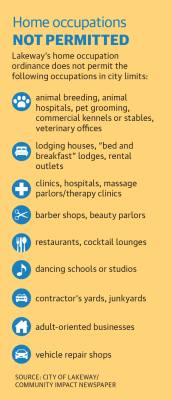This followed a monthslong administrative and legal battle with local day care owner Bianca King.
King sued the city after she was denied a necessary permit for operation and ordered to shut down her day care operation in February. The permit was denied on the grounds that it violated two of the 19 at-home business rules listed in the city’s home occupation ordinance, which outlines rules a business must follow in order to receive a permit for operation.
“There’s a long history of home occupations in general, as long as humans have had homes,” Lakeway Assistant City Manager Joseph Molis said. “Specifically in Texas, there is a long history of allowing things to be home occupations, and when you look at the strict interpretation of this code the way it’s written now, it can be considered overbearing.”
The lawsuit with King prompted the city to review its existing ordinances. On April 6, zoning and planning commission members viewed a preliminary version of the updated ordinance, which corrected many of the major flaws of the original code and removed some rules entirely.
Of the 19 rules, nine were removed; three were altered substantially; four were clarified; and three were not altered.
Council members debated the commission’s recommendations for the ordinance changes, which include restrictions on how many round trips customer-related vehicles can generate per day (three); the type of business that can operate from the home; and if anyone who is not an occupant of the home with a home occupancy permit could work from the home.
King said as it reads the ordinance would force her family to move from Lakeway having created a financial hardship. She said the rules deny Lakeway residents reliable, affordable child care.
“I am grateful the city has drafted a new ordinance, but it has been revised in a way that would shut down my business,” King said.
King operates a state-registered at-home day care out of her Lakeway home. She can care for up to four preschool children in addition to two of her own, ages 2 and 4, according to the court document. She opened her business in January 2021 to support herself after she was laid off during the pandemic.
Directly behind her home is the eighth hole of the Live Oak golf course at the Hills of Lakeway Country Club. After the city received a complaint about King’s business, she was contacted by the city in August and informed she needed an additional permit to continue its operation, according to the court document.
King went through a commission hearing in November in which she was denied her permit for the first time. After appealing the decision to the board of adjustment, King was denied again in February, shortly after which she filed a lawsuit against the city to keep her business open.
King’s lawyer, Jared McClain from the Institute for Justice, said the city needs to think carefully about what interests the city has in imposing additional regulations such as allowing customers to visit a home to purchase a service, but not a good.
“That is the test the courts are going to apply when this case inevitably comes before them,” he said. “It’s also time to revisit that list of permanently banned businesses. What is the difference between a piano lesson and a dance lesson?”
Various home occupations have been outlined by the city in its code as unacceptable, such as animal breeding, junkyards and dance studios. One traditional home-based business that has been accepted by courts is someone who cuts hair or operates a beauty salon. Both in the original code and updated code, however, that occupation is not permitted within Lakeway’s city ordinances, Lakeway City Attorney Cobby Caputo said.
“It’s within the power of the city to change the common law of traditional home-based businesses to better fit the community itself,” Caputo said.
The city and law firm reached an agreement in early March, allowing King to operate her business while the lawsuit proceeds, Lakeway Director of Communications Jarrod Wise said.
King will have the opportunity to reapply for a home occupation permit once the city adopts the revised ordinance, according to the city.
Another lawyer for King, Institute for Justice attorney Erica Smith, said she was happy to see it looks like the council wants to get rid of the three-car limit, calling it arbitrary as well as unconstitutional.
“Right now [King] is the only one there providing a valuable service to the community. She can’t even take a sick day,” Smith said. “I don’t think it’s different for her to have a helper there sometimes, like others have a nanny.”
Smith recommended Lakeway adopt what the state of Texas has done in regard to home occupation; otherwise the city might have a tough time in a court of law with the precedent set by the state.
Council Member Gretchen Vance said the complication she faces in regard to deciding the code around home occupation is the unclear threshold between maintaining property rights and upholding the rights of neighbors simultaneously. Vance said she is seeking a balance that will be amenable to the most people in the city, since what is reasonable to one neighbor might be intolerable to another.
Council Member Louis Mastrangelo said he is embarrassed by the press the city has received by publications such as Forbes magazine.
“I’m more worried that we have vigilantes posing as golfers looking for toys and noise,” he said. “If the "Brady Bunch" moved in next to me, they’d be in violation for making just as much noise.”
Council Member Sanjeev Kumar said he also seeks balance with a revised ordinance.
“If we had not had home occupation we would not have Apple; we would not have HP,” he said. “America was born on home occupation.”
Kumar said he thinks the ordinance is moving in a direction that the council is going to try to make people as happy as they can and balance everyone’s rights.
Council Member Jennifer Szimanksi said the city needs to look at what state regulations are for home occupations.
“I’m 100% in agreement we need to focus on what state regulations are,” she said. “We can’t come up with arbitrary numbers. I am interested to find out what is allowed under state law for the caregiver getting help.”








